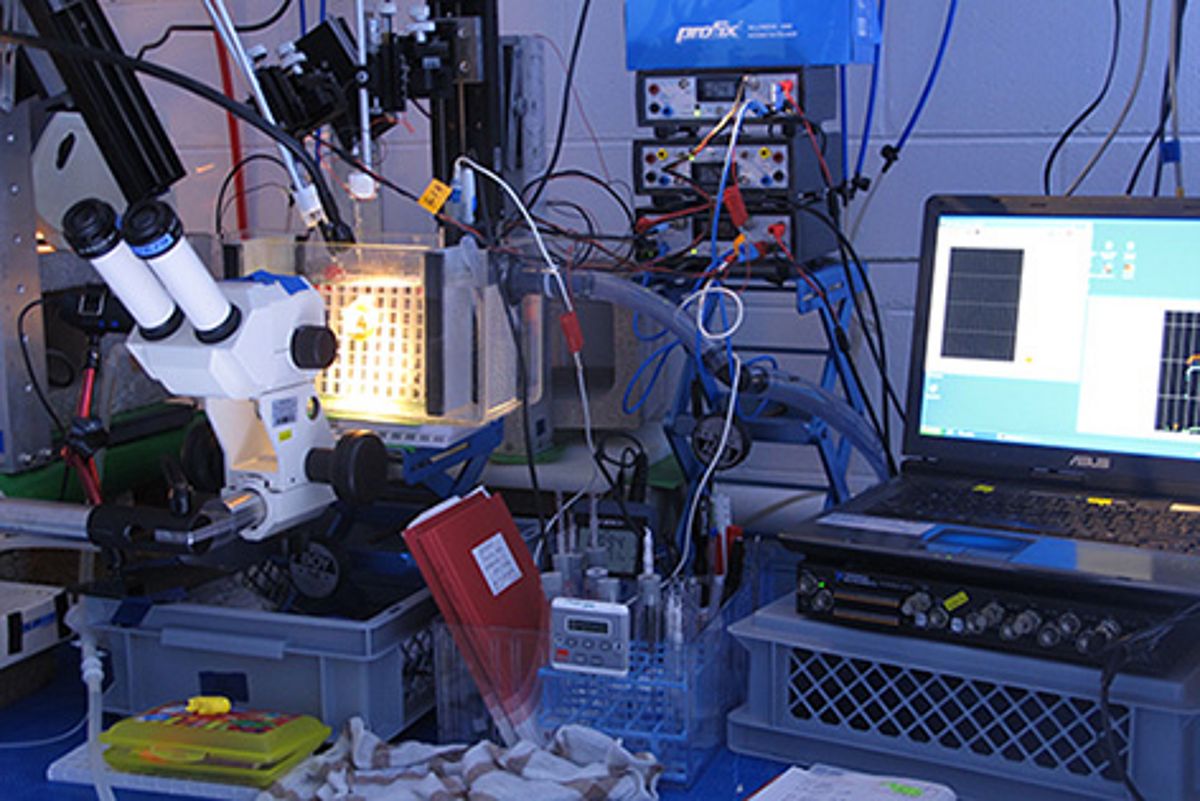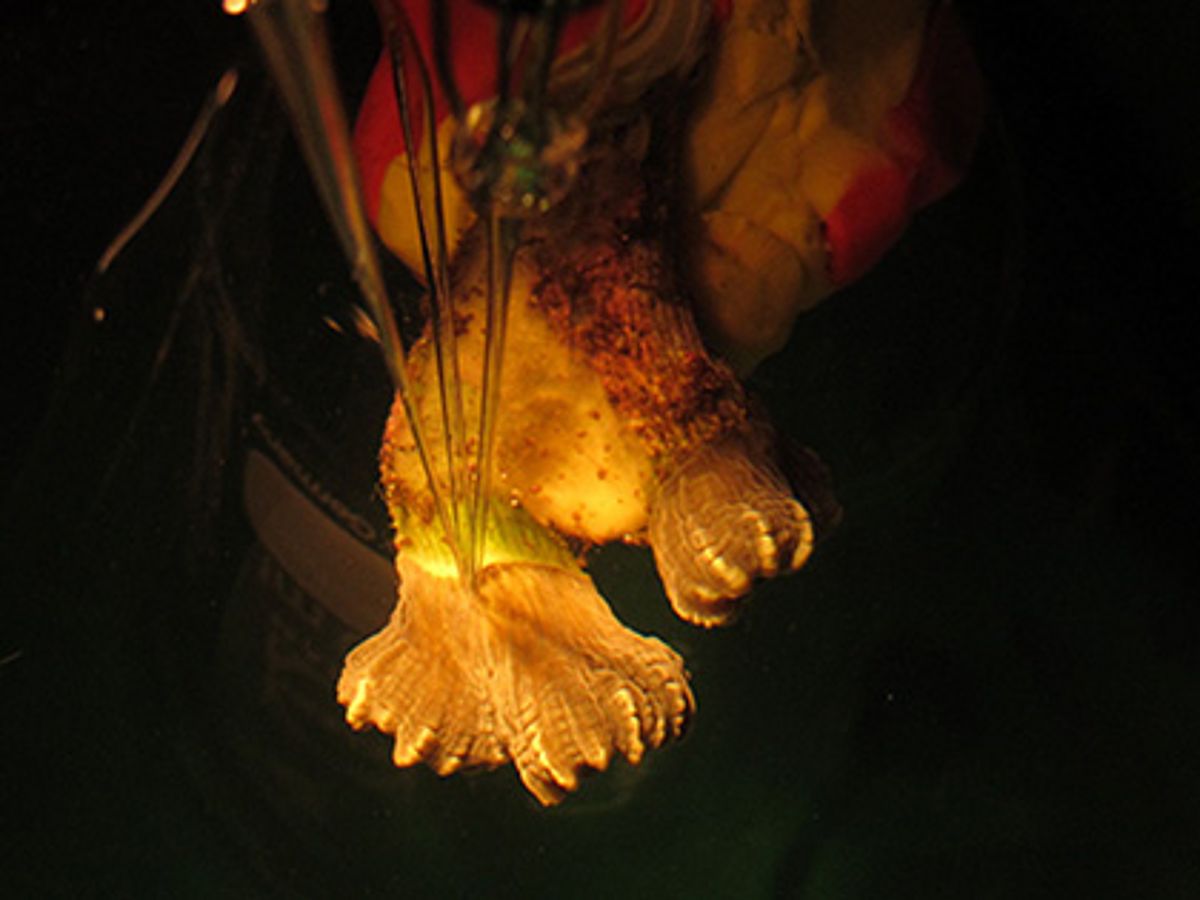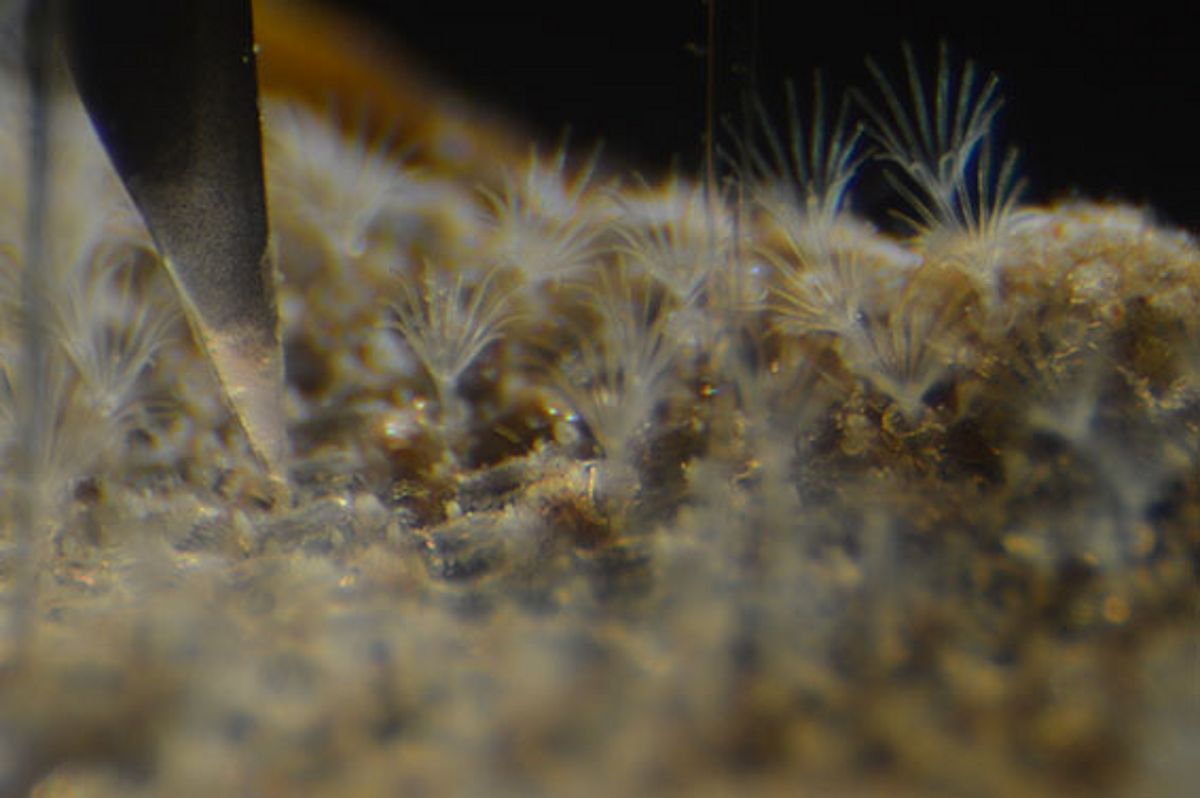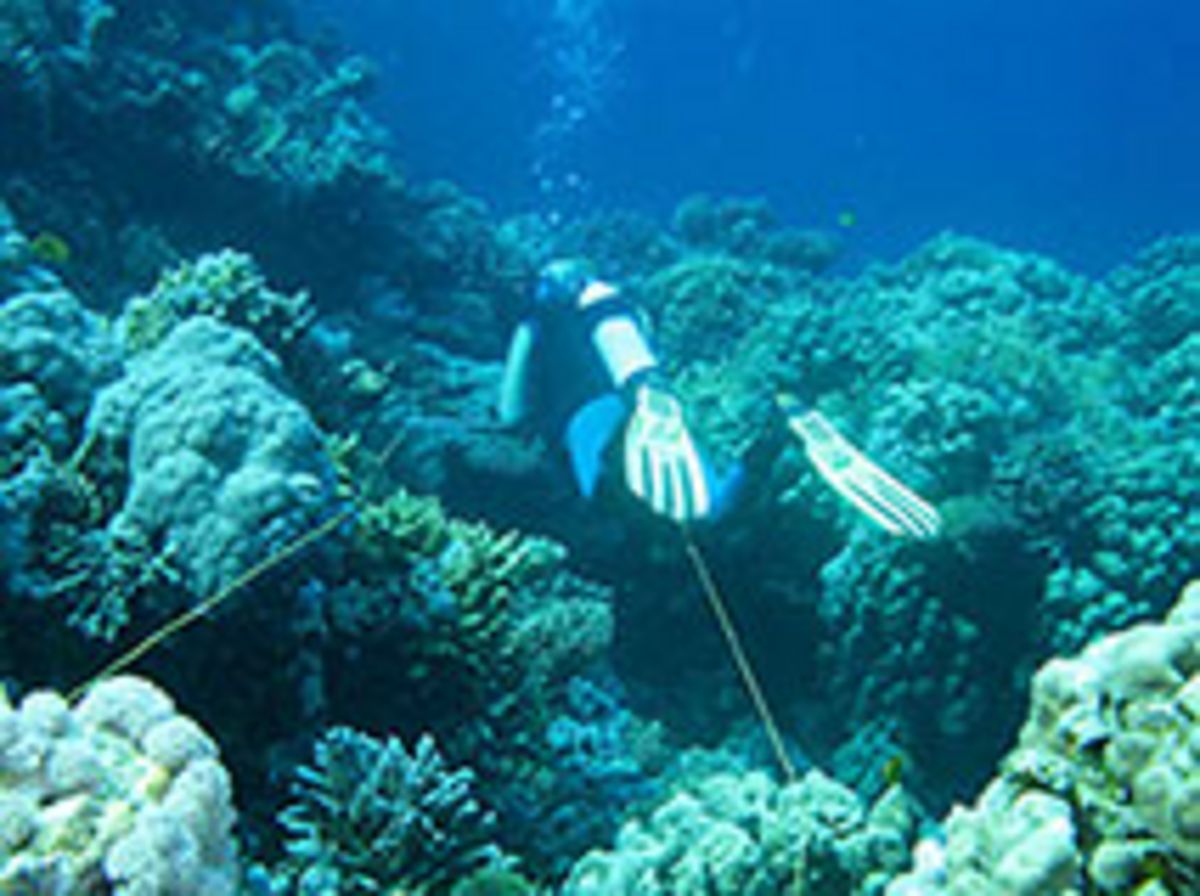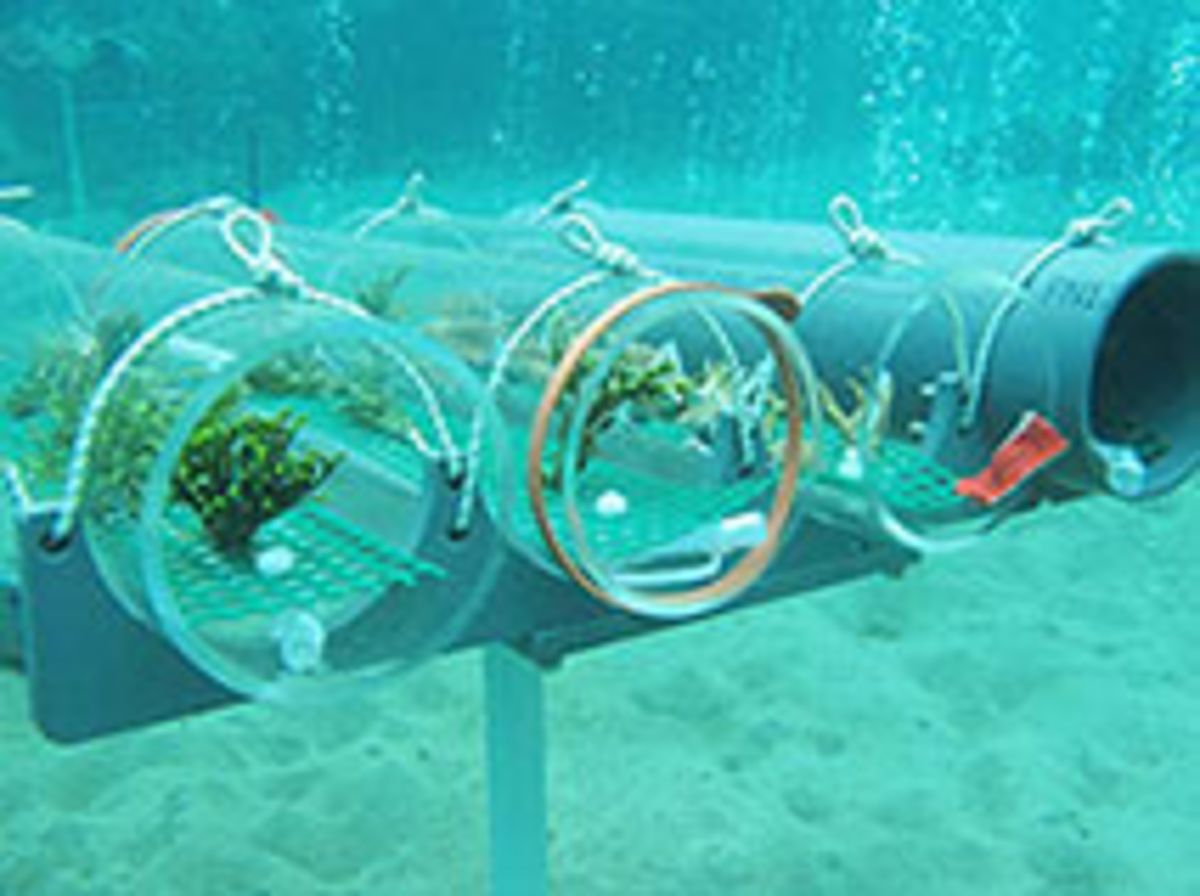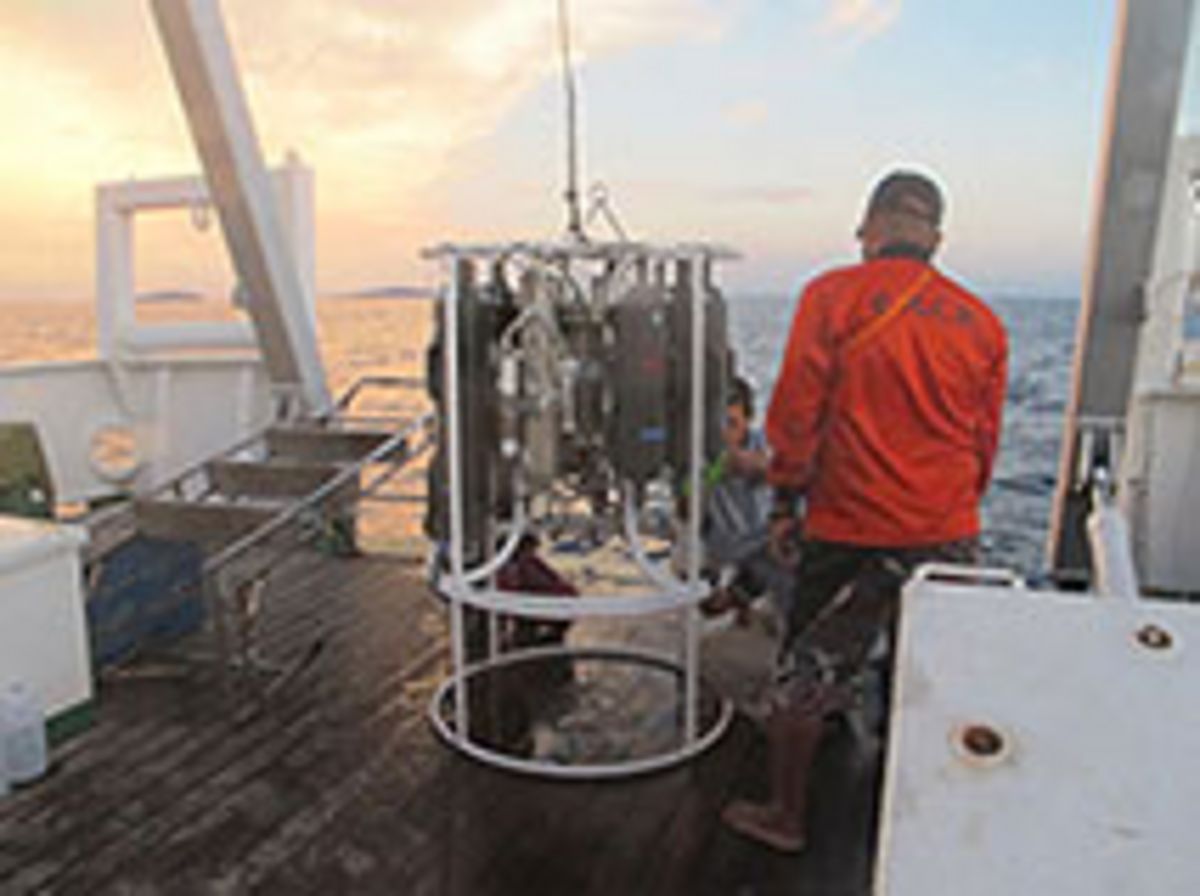Dr. Marlene Wall | RD 3 Marine Ecology | RU Experimental Ecology
Principle Investigator of the Research Group "Coral Adaptations to Extremes" | Topic 6
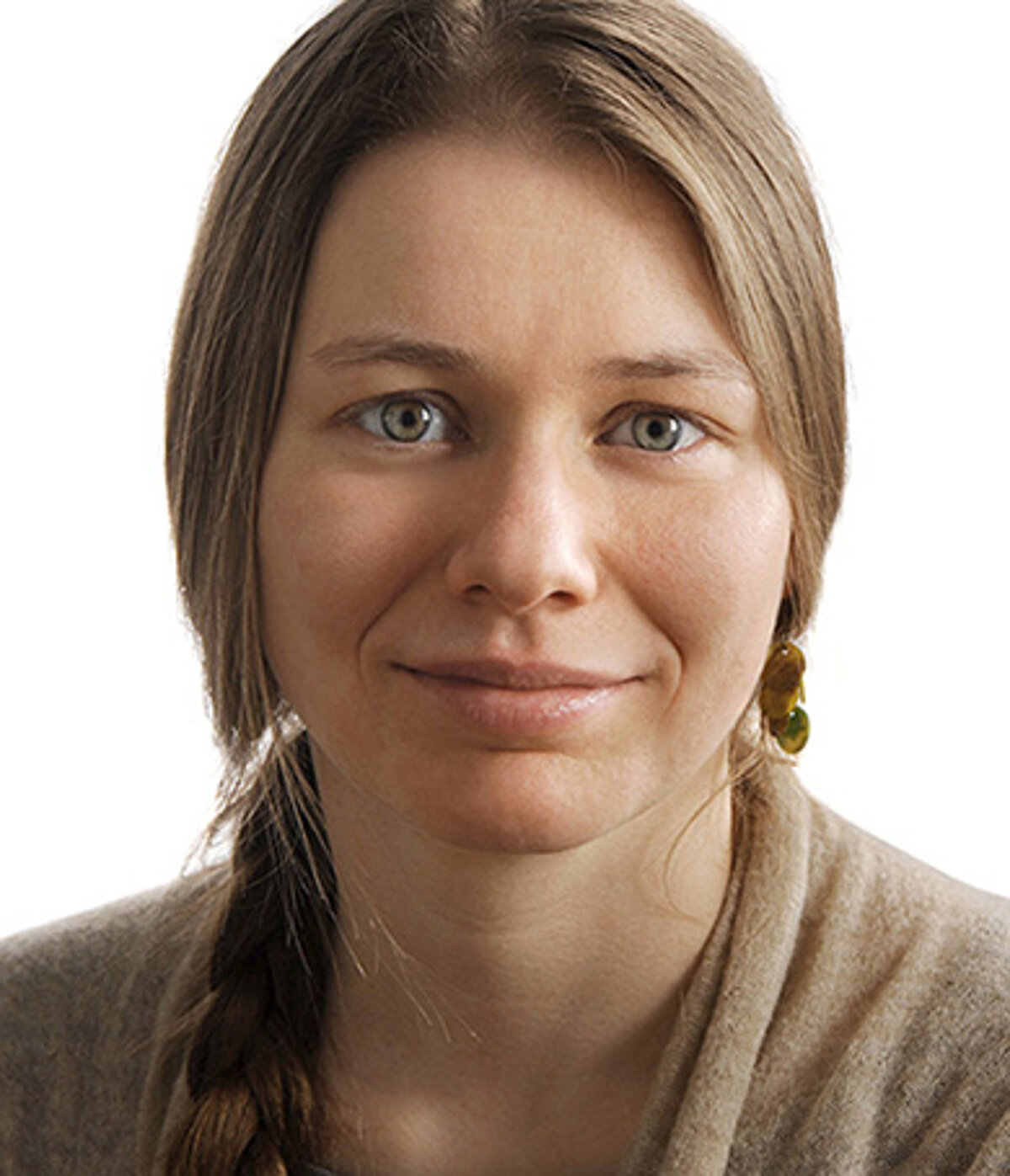
Office:
Room: 1.407
Tel.: +49 431 600-4084
E-Mail: mwall(at)geomar.de
Address:
GEOMAR | Helmholtz-Centre for Ocean Reseach Kiel
Wischhofstr. 1-3
24148 Kiel
ORCID: https://orcid.org/0000-0003-2885-1301
Google Scholar: https://scholar.google.com/citations?user=ASd-_1wAAAAJ&hl=de
Working group webpage: https://www.geomar.de/mwall/reserach-group-coral-adaptation-to-extremes
Academic Appointments
2023 - Groupleader Coral Adapation to Extremes within the research Unit Experimental Ecology
2022 - 2023 Principle Investigator, GEOMAR: ReefCPTrace - Reef-scale climate protection – screening coral skeletal records for proxy traces of natural bleaching mitigation by internal waves, funded by DFG Priority Programme (SPP 2299/Project number 441832482) Tropical Climate Variability and Coral Reefs, 468679988
2020 - 2023 Research Scientist, AWI; DACCOR - Deciphering the Antarctic Cold-water Coral Record Calcification, AWI strategy fund principle investigator
2019 - 2020 Research Scientist, GEOMAR: Can we breed heat resistant corals for reef restoration?, funded by the VW-Stiftung Experiment
2016 - 2019 Research Scientist, GEOMAR: Exploring functional interfaces: extreme biogenic fluctuations may amplify or buffer environmental stress on organisms associated with marine macrophytes, funded by the German Science Foundation (DFG), SA 2791/3-1
09/16 - 03/17 Maternity leave
2016-2017: Principal investigator of the Future Ocean Cluster Proposal: Can assisted evolution help protect heat-wave damaged coral reefs?
2015-2016: FWF-Schrödinger Post-doctoral fellow between: GEOMAR, MPI, Bremen and University of Vienna, Austria; pH up-regulation in tropical corals: a key mechanism? Implications for the future and the past.
2012-2015: Post-doctoral scientist, GEOMAR, within the BMBF “Verbundprojekt” BIOACID (Biological Impact of Ocean Acidification, www.bioacid.de) - Consortium 3: Natural CO2 rich reefs - Workpackage 3.5: Structural and chemical changes on the biogenic carbonates under naturally occurring exposure to high pCO2
Education
2012 PhD in Marine Biology University of Bremen and Alfred-Wegener Institute, Helmholtz Centre for Polar and Marine Research, Bremerhaven, Germany
2008 MSc in Ecology University of Vienna, Vienna, Austria
Current research focus
My current research focuses on the role of natural environmental variability and how it can provide refuge during extreme environmental stress events such as heat waves, protect organisms from severe damage and also make them more resilient to future climate change.
I am investigating coral reefs in the Andaman Sea where large amplitude internal waves protected corals during a severe bleaching event (e.g. Wall et al. 2015, ProcRoySocB, Schmidt, Wall, et al 2016, Coral Reefs) and made them more resilient to thermal stress (Buerger, Schmidt, Wall, et al. 2016, JEMBE). The aim is to better understand such aspects and locations and to incorporate this understanding of adapted coral populations into current reef restoration efforts.
Environmental variability also plays a role in the fitness of cold-water corals, and at the limits of their distribution this can cause additional stress and negatively affect their metabolism (Beck etal 2022, CommsBiol) and presumably their fitness. This also has the consequence that their fatty acid balance is impaired and lipid reserves are probably depleted to a greater extent than in habitats with less environmental variability (Wall etal 2024, FuncEcol).
The overarching goal is to better characterize natural environmental fluctuations and to understand how they influence and change the stress response of organisms. Can they “train” organisms for climate change or are they bringing them closer to their limits? For improved ecosystem management in times of climate change, it is crucial to understand the phenotypic plasticity of organisms and their adaptive potential, as well as to identify natural sites that provide refuges. All of this together will determine future biodiversity. We also need to adapt this knowledge to different local environmental conditions and incorporate it into ongoing ecosystem restoration efforts.
Research Approaches and Expeditions
I take advantage of natural marginal conditions (eg. exposure to LAIW, natural pCO2 gradients) and use them as natural laboratories to investigate physiological and ecological changes. I study environmental fluctuations from the microscale within an organisms' diffusive boundary layer using microsensors to the macroscale by environmental monitoring probes and devices (WTW probes, CTD, ADCP, etc), combine it with ecophysiological investigations as well as evaluation of ecosystem conditions. I also work interdisciplinary and apply geochemical tools to decipher physiological adjustments under present day environmental conditions but also to deduce physiological acclimations throughout their past.
Cold-water coral expedition to Huinay, Chile, 2021, 2022 in cooperation with Fundacion San Ignacio del Huinay, Chile, lead-scientist: Dr. Marlene Wall
Tropical coral reef ecology - Expeditions to Andaman Sea off-shore islands, Thailand, 2020, 2019, 2018, 2016, 2011, 2010, 2009 in cooperation with the Phuket Marine Biological Center, Thailand, changing lead-scientists: Dr. Marlene Wall, Dr. Getraud Schmidt, Dr. Anna Roik, Prof. Claudio Richter
Coral physiological adaptations and mechanisms - Experimental work at the National Sea Simulator, 2015 in cooperation with Australian Institute of Marine Science Townsville, Australia, Alfred-Wegener Institute, Bremerhaven, Germany, Max-Planck Institute, Bremen, Germany, lead-scientist: Dr. Dirk de Beer
Coral reefs windows into the future - Expeditions to Normanby Islands, Papua New Guinea, 2014 & 2013 in cooperation with Australian Institute of Marine Science Townsville, Australia, Alfred-Wegener Institute, Bremerhaven, Germany, University of Bremen, Germany, Max-Planck Institute, Bremen, Germany, lead-scientists: Dr. Katharina Fabricius and Dr. Dirk de Beer
Cold-water coral ecology pilot studies and European Scientific Diving Training in Huinay, Chile, 2009 in cooperation with Fundacion San Ignacio del Huinay, Chile, lead-scientist: Prof. Claudio Richter
Coral associated fishes in the future - Expedition to Dahab, Egypt, 2007 in cooperation with Red Sea Center, Egypt, lead-scientist: Dr. Jürgen Herler
Selected Publications
Wall M, Doering T, Pohl N, Putchim L, Ratanawongwan T, Roik A (pre-print, in review CommsBiol) Natural thermal stress- hardening of corals through cold temperature pulses in the Thai Andaman Sea. bioRxiv: doi.org/10.1101/2023.06.12.544549
Roik A*, Wall M*, Dobelmann M, Nietzer S, Brefeld D, Fiesinger A, Reverter M, Schupp PJ, Jackson M, Rutsch M, Strahl J (pre-print, in review STOTEN) Trade-offs in a reef-building coral after six years of thermal acclimation. bioRxiv: doi.org/10.1101/2023.07.20.549699
Wall M, Beck KK, Garcia-Herrera N, Schmidt-Grieb GM, Laudien J, Höfer J, Försterra G, Held C, Nehrke G, Woll M, Graeve M, Richter C (2024) Lipid biomarker reveal trophic relationships and energetic trade-offs in contrasting phenotypes of the cold-water coral Desmophyllum dianthus in Comau Fjord, Chile. Functional Ecology, 38 (1), 126-142.
Fiesinger A, Held C, Melzner F, Putchim L, Reusch TBH, Schmidt AL, Wall M (2023) Population genetic differentiation of the ubiquitous brooding coral Pocillopora acuta along Phuket Island reefs in the Andaman Sea, Thailand. BMC Ecology and Evolution, 23 (1), 42.
Beck KK, Schmidt-Grieb GM, Laudien J, Försterra G, Häussermann V, González HE, Espinoza JP, Richter C & Wall M (2022). Environmental stability and phenotypic plasticity benefit the cold-water coral Desmophyllum dianthus in an acidified fjord. Communications Biology, 5(1), 683.
Fietzke J, & Wall M (2022). Distinct fine-scale variations in calcification control revealed by high- resolution 2D boron laser images in the cold-water coral Lophelia pertusa. Science Advances, 8, eabj4172.
Doering T, Wall M, Putchim L, Ratanawongwan T, Schroeder R, Hentschel U, Roik A (2021) Microbiome transplantation between corals mitigates the bleaching response of heat-sensitive individuals. Microbiome, 9, 102, doi: 10.1186/s40168-021-01053-6.
Franke A, Blenckner T, Duarte CM, Ott K, Fleming LE, Antia A, Reusch TBH, Bertram C, Hein J, Kronfeld-Goharani U, Dierking J, Kuhn A, Sato C, Van Doorn E, Wall M, Schartau M, Karez R, Crowder L, Keller D, Engel A, Hentschel U, Prigge E (2020) Operationalizing Ocean Health : Toward Integrated Research on Ocean Health and Recovery to Achieve Ocean Sustainability. OneEarth, doi.org/10.1016/j.oneear.2020.05.013.
Wall M, Crook ED, Fietzke J, Paytan A (2019) Using B isotopes and B/Ca in corals from low saturation springs to constrain calcification mechanisms. Nature Communication, doi: 10.1038/s41467-019-11519-9.
Wall M, Putchim L, Schmidt GM, Jantzen C, Phongsuwan N, Khokiattiwong S, Richter C (2015) Large-amplitude internal waves benefit corals during heat stress. Proceedings of the Royal Society - Biological Sciences, 282: 20-28.
*shared first/last authorship
Public Outreach
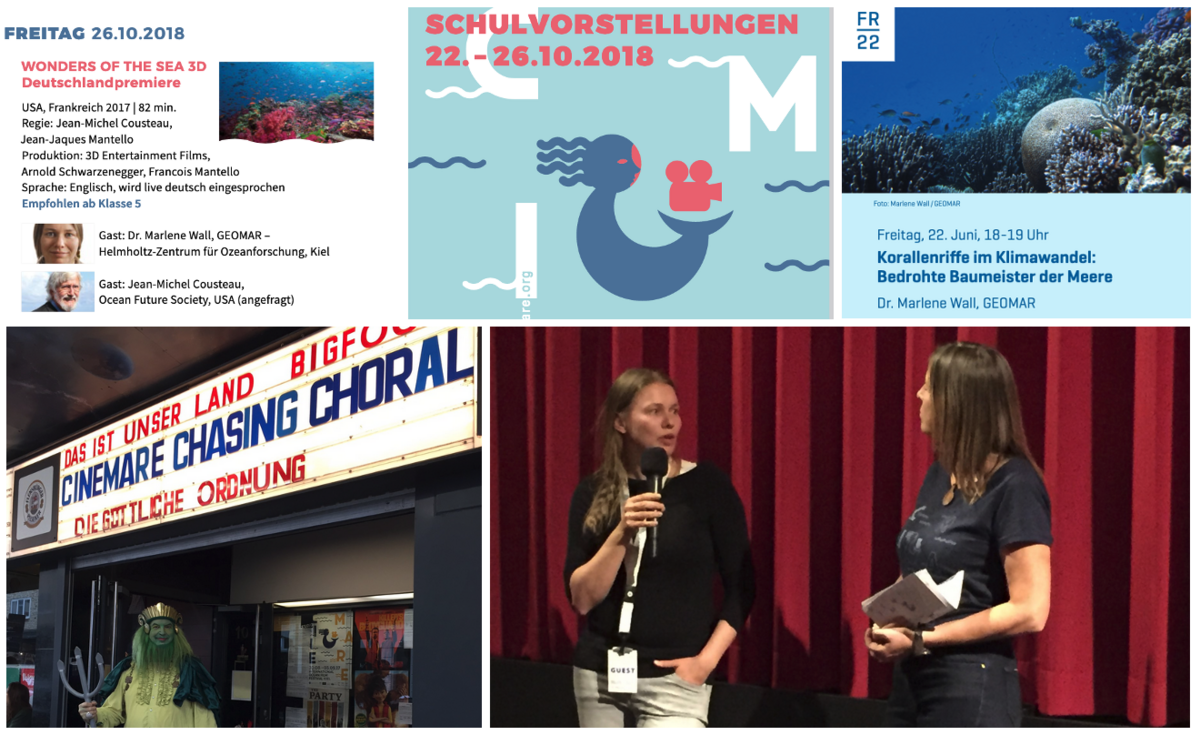
Outreach activity. ©upper row: cinemare.org catalogue 2018 & Kieler Woche Vortragsreihe Programm, lower row: infomedia-sh on "X"
NDR Interview DAS! 2022 – Interview based on the Science Advances publication Fietzke & Wall (2022) and visualization of coral calcification.
Bayrischer Rundfunk 2022 – Interview for the series “Tipping elements in the climate system – Coral reefs”.
Geomar Open Day 2019 - Public presentation on "Coral reefs in a changing climate - endangered ecosystem engineers".
CineMare Int'l Ocean Film Festival Kiel 2018 - Invited guest after the movie screening "Wonders of the Sea" from Jean-Michel Cousteau for schools to discuss with the pupils about the conditions and futures of marine ecosystems.
CineMare Int'l Ocean Film Festival Kiel 2017 - Invited guest after the movie screening "Chasing Coral" from Jeff Orlowski to discuss the film, coral reef research and the future of coral reefs
Kieler Woche 2018 public presentation in course of the "Third International Year of the Reef - IYOR2018" - Titel: Korallenriffe im Klimawandel: Bedrohte Baumeister der Meere
Gallery
Using microsensors to study animal physiology and diffusive boundary layer characteristics:
Experimental approaches



